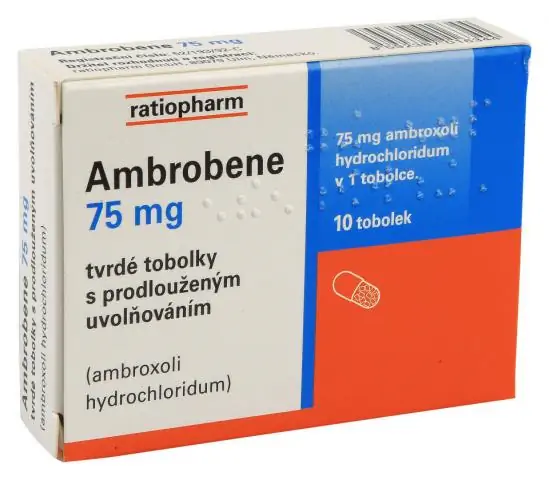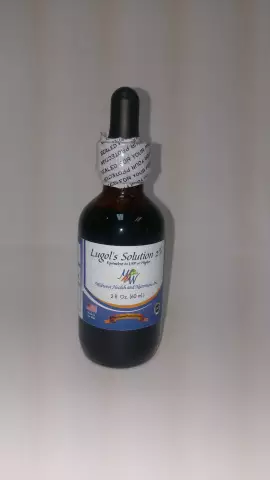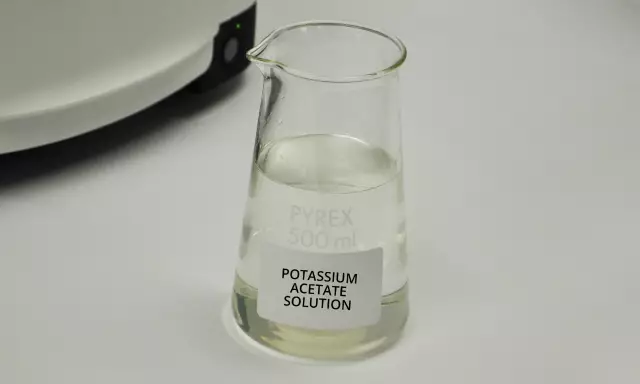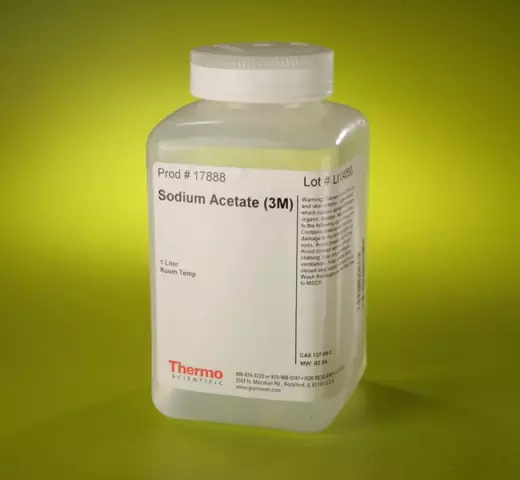- Author Rachel Wainwright wainwright@abchealthonline.com.
- Public 2023-12-15 07:39.
- Last modified 2025-11-02 20:14.
Polimuramil
Polimuramil: instructions for use and reviews
- 1. Release form and composition
- 2. Pharmacological properties
- 3. Indications for use
- 4. Contraindications
- 5. Method of application and dosage
- 6. Side effects
- 7. Overdose
- 8. Special instructions
- 9. Application during pregnancy and lactation
- 10. Use in childhood
- 11. Drug interactions
- 12. Analogs
- 13. Terms and conditions of storage
- 14. Terms of dispensing from pharmacies
- 15. Reviews
- 16. Price in pharmacies
Latin name: Polimuramil
ATX code: L03
Active ingredient: fragments of peptidoglycan of the cell wall of gram-negative bacteria Salmonella typhi strain Tu-2 No. 4446 (cell wall peptidoglycan fragments of gram-negative bacteria salmonella typhi strain Tu-2 No.4446)
Producer: Joint-Stock Company Scientific and Production Company "Kombiotech" (Russia)
Description and photo update: 2019-28-11

Polimuramil is an immunomodulatory agent of bacterial origin.
Release form and composition
The drug is produced in the form of a solution for intramuscular (i / m) administration: clear liquid without color (0.5 ml in a glass ampoule, in a cardboard box with a snake insert 5 or 10 ampoules; in a blister strip made of polyvinyl chloride 5 or 10 ampoules, in a cardboard box 1 blister strip and instructions for use of Polimuramil; an ampoule knife can be inserted into the pack).
0.5 ml of solution (1 ampoule) contains:
- active substance: polyuramil (fragments of peptidoglycan of the cell wall of gram-negative bacteria Salmonella typhi strain Tu-2 No. 4446) - 200 μg;
- additional components: water for injection - 0.5 ml.
Pharmacological properties
Pharmacodynamics
Polymuramil is a natural immunomodulator of innate and adaptive immunity, which is a standardized combination of three highly purified low molecular weight peptidoglycan components of the cell wall of gram-negative bacteria with an established chemical structure. The drug enhances the body's immune defense against bacterial, viral and fungal infections. Promotes an increase in the effectiveness of antibiotics when used in combination with them.
The molecular mechanisms of the pharmacological action of the active substance are realized as a result of the interaction of the intracellular receptors NOD1 and NOD2 of monocytes, macrophages and some other cells of the immune system. Through the binding of these receptors, not only the most important signals for the activation of innate immunity and immunoregulation are transmitted, but also a stable state of enhanced resistance to various infectious agents is caused (the phenomenon of trained immunity).
Polymuramil promotes the absorption and intracellular destruction of pathogenic microorganisms by phagocytic cells. The drug also increases the ability of macrophages, monocytes and dendritic cells to produce a number of cytokines, such as tumor necrosis factor-alpha (TNF-α), interleukin-12, granulocyte-macrophage colony-stimulating factor (GM-CSF), which activate humoral and cellular immunity. The immunomodulator enhances the functional activity of natural killers, which are of great importance for antiviral and antitumor immunity, increases the production of immunoglobulins (Ig) A and G, and normalizes the serum IgE level in the blood at their initially increased concentration.
In the course of preclinical studies on a model of influenza in mice, the ability of Polimuramil under conditions of acute inflammation, when administered intramuscularly, to reduce the excessive production of pro-inflammatory cytokines, in particular TNF-α, was demonstrated. On the model of influenza in ferrets, the use of the drug showed a decrease in elevated body temperature and a weakening of the severity of morphological manifestations of the inflammatory process in the bronchi and lungs. On the model of immunosuppression induced by tacrolimus, the restorative effect of Polimuramil on the level of circulating TNF-α was recorded, which provided an increase in cytokine production in the experiment by 10-50 times when compared with the group of animals subjected to immunosuppression. It was determined that these reactions develop in short periods of time - up to 2 hours.
In patients with chronic pyoderma, due to the action of the drug, the severity of edema and hyperemia of the affected skin areas decreased. At the same time, a persistent effect was recorded, as evidenced not only by the induction of clinical remission of the disease, but also by a decrease in the content of pro-inflammatory cytokines in the blood plasma 14 days and 6 months after the start of therapy.
The drug does not have teratogenic, embryotoxic, mutagenic and carcinogenic properties.
Pharmacokinetics
According to the results of preclinical studies, after i / m injection of polymuramil, the active substance was quickly detected in the blood plasma, and then it was intensively excreted from the body of animals.
With the i / m administration of the drug at a dose of 2.5 mg / kg, its maximum concentration (C max) in the blood plasma was 4.5 ng / ml, and T Cmax (time to reach C max) was 5-10 minutes. The half-life (T 1/2) was 40-45 minutes. The profile of the pharmacokinetic curve had a nonclassical appearance with two peaks in the plasma content of the active components of the drug. 90 minutes after administration and later, the drug was not detected in blood plasma.
Indications for use
Polimuramil is recommended for use in adults simultaneously with antibacterial agents in the complex therapy of the following diseases / conditions:
- acute and chronic pyoderma, ostiofolliculitis, deep folliculitis, sycosis, hydradenitis, impetigo, carbuncle, furunculosis, abscesses;
- secondary immunodeficiency states, manifested in the form of chronic, recurrent, sluggish infectious and inflammatory processes in the skin and soft tissues;
- surgical infections, including postoperative purulent-septic complications (prevention / treatment).
Contraindications
- age up to 18 years;
- pregnancy and lactation;
- hypersensitivity to the components of the immunomodulating agent.
Polimuramil, instructions for use: method and dosage
A solution of Polimuramil is administered i / m.
Recommended dosage regimen: daily at a dose of 200 mcg / 0.5 ml, the duration of the course is determined by the clinical picture.
The duration of treatment in combination therapy is usually 5 days.
Side effects
While using the drug, chills, soreness at the injection site, and a temporary increase in temperature to 37.5 ° C may occur.
Overdose
A symptom of an overdose of Polimuramil may be an increase in body temperature. At febrile temperatures, palliative treatment is recommended.
special instructions
In the presence of infectious processes, the action of Polimuramil cannot replace the effect of antibiotics.
Influence on the ability to drive vehicles and complex mechanisms
The immunomodulator does not affect the ability to drive a car and control complex and potentially dangerous equipment.
Application during pregnancy and lactation
For pregnant and lactating women, drug therapy is contraindicated.
Pediatric use
For patients under 18 years of age, the use of the drug is contraindicated.
Drug interactions
Polimuramil solution can be used simultaneously with anti-inflammatory and antimicrobial drugs.
Analogs
Polimuramil analogs are Galavit, Polyoxidonium, Laennek, Gepon, Deoxinat, Likopid, Stemokin, Uro-Vaxom.
Terms and conditions of storage
Store in a place out of reach of children, protected from light, at a temperature of 2 to 8 ° C, avoiding freezing.
The shelf life is 5 years.
Terms of dispensing from pharmacies
Dispensed by prescription.
Reviews about Polimuramil
The few reviews about Polimuramil that patients leave on specialized sites are predominantly positive. They note the effectiveness of the immunomodulator when used in combination with antibacterial drugs. Acting as part of complex therapy, it accelerates the healing of purulent-inflammatory lesions in the skin and soft tissues, both in acute and in chronic course of the disease. The drug has also proven itself well in the prevention / treatment of surgical infections, including purulent-septic complications in the postoperative period. In addition, its advantages include a short course of treatment.
The disadvantages are high cost, soreness at the injection site and the absence of the drug in many pharmacies. There are no complaints about adverse drug reactions.
The price of Polimuramil in pharmacies
The price of Polimuramil, a solution for intramuscular injection (200 μg / 0.5 ml), can be 1,850-2,100 rubles. per package containing 5 ampoules of 0.5 ml.

Anna Kozlova Medical journalist About the author
Education: Rostov State Medical University, specialty "General Medicine".
Information about the drug is generalized, provided for informational purposes only and does not replace the official instructions. Self-medication is hazardous to health!






